SUMMARY
This is AI generated summarization, which may have errors. For context, always refer to the full article.
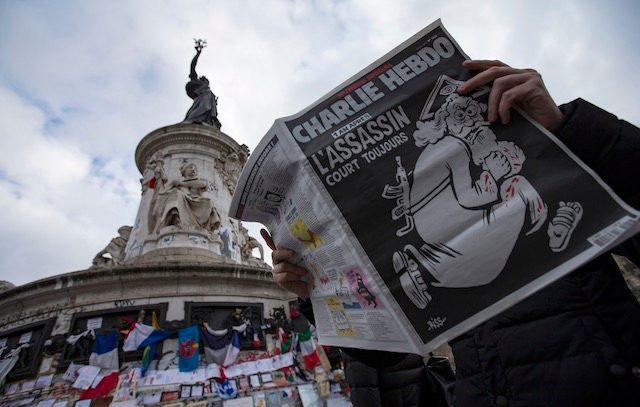
PARIS, France – “The assassin is still on the run,” the cover of Charlie Hebdo reads, on the edition marking the first year anniversary of the attacks that killed 11 of its editorial staff.
The ‘assasin’ being referred to is God, depicted on the cover wearing a blood-stained robe and carrying a Kalashnikov.
It was a statement on religion, a suggestion that it was faith that drove two brothers to attack journalists whose drawings disrespected their beliefs.
I was never really tickled by the humor of Charlie Hebdo. Many readers find its mockery of the prophet Mohammed, the Pope, and rabbis – among other world figures – deeply offensive.
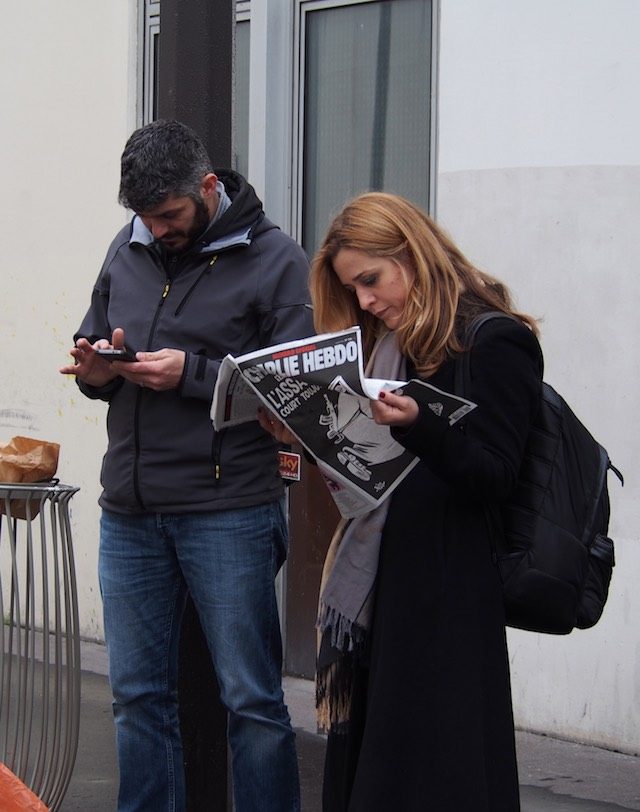
But whether one was a fan of the French satirical magazine or not, whether one found its irreverence well-meaning or not, the attacks on its cartoonists and editors one year ago by Al Qaeda sympathisers sparked universal outrage.
It was an attack against the freedom of expression, in a country where it is dearly held.
“Je suis Charlie,” (“I am Charlie”), people across the world declared on social media, standing in solidarity with France and in support of this freedom.
Looking back at last year’s attacks, the magazine’s director who goes by the pen name Riss, said Charlie Hebdo was not calculating motives when it crafted its cartoons.
“It was spontaneous, we didn’t force ourselves. For us it was obvious. We didn’t ask ourselves if it was worth it. It’s like asking, ‘is it worth living, laughing?’ Because France is a secular country. you should have the right to say or draw whatever you want,” Riss said in an interview with CNN.
I spent a sabbatical in France starting January last year, moving to Paris with my partner and our then 3-month-old daughter, a few weeks after the Charlie Hebdo attacks.
My first impression was that the streets felt somewhat like Jerusalem, where Israeli Defense Forces (IDF) soldiers are a fixture. There, it’s not unusual to see troops in in synagogues, mosques, malls and train stations. But it is a country in conflict, and has undergone two intifadas.
Paris, on the other hand, is famous for being magical and romantic. Somehow, M-16-toting troops standing guard at the steps of Trocadero, overlooking the Eiffel Tower, destroys that magic.
Preface
It was comforting to see that the state was ramping up security. But it was also a reminder that a threat was lurking.
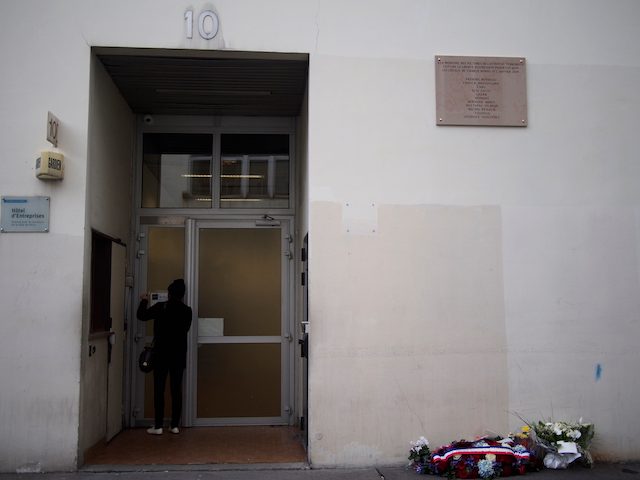
The Charlie Hebdo attacks, unfortunately, was a preface. And indeed, the threats were only getting larger.
As the war in Syria raged, and the international community remained incapable of hammering out a resolution between rebels and Bashar al-Assad, a nefarious group calling itself Islamic State (ISIS, known in France as Daech, after an Arabic acronym) was gradually gaining territory. Its purist interpretation of Islam was attracting supporters around Europe. In France alone, an estimated 800 people have been suspected of joining terrorist activities in Syria and Iraq.
Despite the terrorist links, the events in Paris on November 13 still came as a shock. Suicide bombers and gunmen killed 130 people in coordinated attacks, in a football stadium, around trendy restaurants, and in the Bataclan concert hall. The killers were traced to an Islamic State cell operating in France and Belgium.
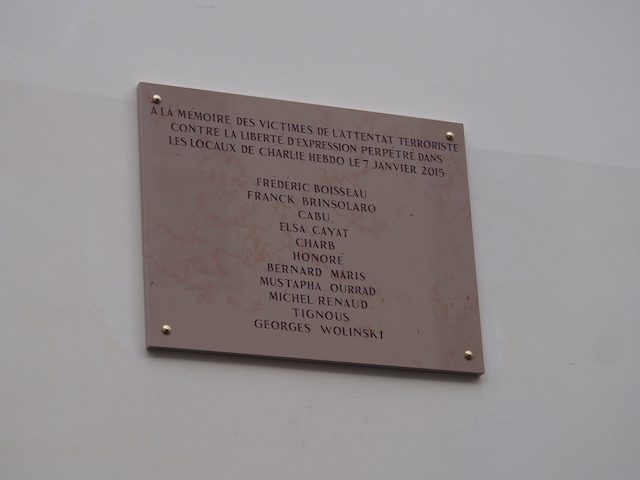
The Charlie Hebdo attacks targeted journalists, and the shooting at a kosher supermarket two days later struck at a Jewish community. November’s mass killings, the worst in France since World War 2, were aimed at anyone.
Though normality has resumed in Paris – tourism even saw a nearly 4% hike in the third quarter of 2015, and visitors flocked to the city for the holidays – a sense of insecurity hangs over Parisians.
“We must be vigilant, we know there is a threat,” a Paris resident told me, refusing to give her name. Teary-eyed, she lit a candle for the Charlie victims at a makeshift memorial in Place de la Republique.
Flowers, photos and messages flood the massive monument, that has also become a tourist attraction, in the same vein as the World Trade Center in New York.
“The flowers are still here, that’s because the pain hasn’t passed,” said a Congolese immigrant who gave his name as James Bond.
He went around the monument, re-lighting candles whose flames had been blown out.
“We’re not secure. It can affect anyone,” he said, sharing a widespread fear that a terror attack can happen anytime.
Bigger threat
At Hypercacher, the kosher supermarket where 4 Jews were killed by a man who pledged allegiance to ISIS, flowers offered by French president François Hollande lay under a plaque honouring the victims.
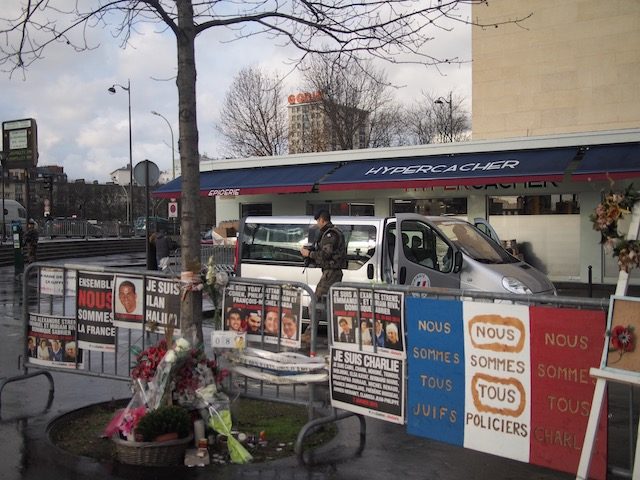
After the attacks, Israeli Prime Minister Benjamin Netanyahu offered Israel as a refuge for French Jews, encouraging them to emigrate.
Norbert Abraham, a Jew who lives next door to Hypercacher, says he’s not cowed by Islamist threats.
“It’s my home,” he said, referring to France. “I will not be chased away from my home.”
I think about France too as my home, my new home, especially since my daughter carries French citizenship and has developed a fondness for baguettes. I left Manila definitively last November, and started a new job in Paris.
What I love about Paris is that it’s home to people from all over the world.
But the events of last year, beginning with the Charlie attacks and ending with the Bataclan shootings, have cast a shadow on immigration in France, especially after some suspects linked to the gunmen were found to have entered Europe through the refugee trail.
I hope security threats do not become an excuse for France, or for Europe in general, to close its doors to immigrants or to discriminate against certain races or religions, Islam in particular.
I remember when the Mamasapano case prompted an anti-Muslim sentiment among Filipinos, with several voices including some in government questioning the peace deal with the MILF.
Though the terror threat in France is serious, the bigger threat is hatred.
The cartoons of Charlie Hebdo poked fun at bigots and extremists. It ridiculed cruelty and self-entitlement. It did not mean to spread hatred.
Walking at the Place de la Republique on Wednesday, I couldn’t help but shed a tear too, as I read some of the tributes and looked at photos of the victims from last year’s attacks.
“Thank you Charlie,” one message said. “Courageous…free thinker, libertarian, the spirit of Charlie is immortal.” – Rappler.com
Michaela Cabrera is a freelance journalist, and works as a producer for a French news channel.
Add a comment
How does this make you feel?
There are no comments yet. Add your comment to start the conversation.